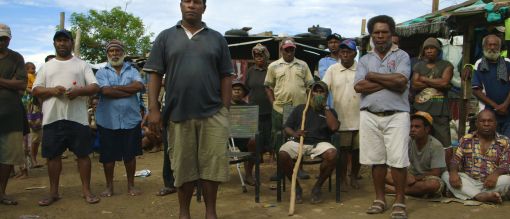New research has found that a community in Port Moresby who were forcibly evicted and their homes demolished without compensation at the behest of a company with significant Australian ties, are still struggling to access basic needs and rights, even years after their eviction.
The research report, Haus Bagarap, Hevi Kamap (Homes destroyed, livelihoods lost) - Voices from the aftermath of community evictions and displacement at Paga Hill, is the first comprehensive research in Papua New Guinea to explore the impacts of forced evictions on people’s living conditions. The report is a joint report between Aid/Watch Australia, Jubilee Australia Research Centre and the Paga Hill community.
Allan Mogerama, Paga Hill community leader said, “My community is a pioneer informal settlement in Port Moresby. Once home to 3000 people our peaceful settlement was violently evicted and demolished. The PNG Government needs to do away with its tendency of allowing foreign corporations to deliberately displace its own people. We welcome development however we need it to be fairly compensated for our loss and our rights to be respected.”
The people of Paga Hill, a community renowned for its safety and creativity in Port Moresby, were forcibly evicted from their homes as a result of a series of evictions that took place in 2012 and 2014. They were evicted at the behest of the Paga Hill Development Company, a PNG company with significant Australian ties, in order to build a multi-million dollar development, the Paga Hill Estate (also designed by Australians), which has never been built.
Natalie Lowrey, Coordinator, Aid/Watch, said, “Our joint research reveals after the evictions, and the Paga Hill community was displaced across Port Moresby, their living conditions have dramatically worsened. Without their right to housing many of their other basic rights have been undermined and compromised including safety, appropriate sanitation and access to water and electricity.”
The research found that none of the people interviewed were experiencing the same fulfillment of basic needs and rights that they had at Paga Hill – where 96 per cent of people interviewed had access to most basic needs and rights.
Since their displacement, the research reveals, people’s living conditions have dramatically worsened including. The majority (64 per cent) do not feel they have security of tenure in their new location, something that was promised to them pre-eviction.
“One of the startling statistics we found was that 25 per cent of all people interviewed for the study directly blamed the death of family members or friends on the demolitions, evictions and relocation,” continued Ms Lowrey.
“This included deaths due to stress and trauma, inability for the aged and infirm to receive care following eviction, and violence and murder.”
The report recommends that the NCDC ensure that the Paga Hill community is provided with secure tenure, and access to basic infrastructure such as water and electricity.
The report also recommends the NCDC and the Paga Hill Development Company provide compensation for the destruction of the community’s property and possessions.
The report also makes recommendations to the PNG and Australian governments, citing the obligations of both under international law and the UN Guiding Principles on Business and Human Rights.
“There is no denying that responsibility for this tragedy lies partly with Australian corporate actors,” said Dr Luke Fletcher, Executive Director of Jubilee Australia.
“This report is further evidence that Australia currently has insufficient mechanisms by which to hold to account companies that are connected to human rights violations in overseas jurisdictions.”
______
The report is a joint report between Aid/Watch Australia, Jubilee Australia Research Centre and the Paga Hill community, and follows comprehensive research and interviews with 190 former residents of the Paga Hill community.
About Aid/Watch Australia
Since 1992, Aid/Watch has been the only independent monitor of Australia’s international aid and development. Through campaigning, advocacy and research that is centred in justice, Aid/Watch acts in solidarity and collaborates with frontline communities and networks to expose Australian foreign policy mechanisms and development aggression that undermines the environment as well as Indigenous Peoples and local communities in determining their own futures.
About Jubilee Australia Research Centre
Jubilee Australia Research Centre engages in research and advocacy to promote economic justice for communities in the Asia-Pacific region and accountability for Australian corporations and government agencies operating there.
